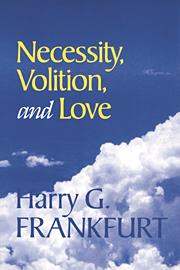Book contents
- Frontmatter
- Contents
- Preface
- Sources
- 1 The Logic of Omnipotence
- 2 Descartes's Discussion of His Existence in the Second Meditation
- 3 Descartes on the Creation of the Eternal Truths
- 4 Two Motivations for Rationalism: Descartes and Spinoza
- 5 Continuous Creation, Ontological Inertia, and the Discontinuity of Time
- 6 Concerning the Freedom and Limits of the Will
- 7 On the Usefulness of Final Ends
- 8 The Faintest Passion
- 9 On the Necessity of Ideals
- 10 On God's Creation
- 11 Autonomy, Necessity, and Love
- 12 An Alleged Asymmetry between Actions and Omissions
- 13 Equality and Respect
- 14 On Caring
3 - Descartes on the Creation of the Eternal Truths
Published online by Cambridge University Press: 15 December 2009
- Frontmatter
- Contents
- Preface
- Sources
- 1 The Logic of Omnipotence
- 2 Descartes's Discussion of His Existence in the Second Meditation
- 3 Descartes on the Creation of the Eternal Truths
- 4 Two Motivations for Rationalism: Descartes and Spinoza
- 5 Continuous Creation, Ontological Inertia, and the Discontinuity of Time
- 6 Concerning the Freedom and Limits of the Will
- 7 On the Usefulness of Final Ends
- 8 The Faintest Passion
- 9 On the Necessity of Ideals
- 10 On God's Creation
- 11 Autonomy, Necessity, and Love
- 12 An Alleged Asymmetry between Actions and Omissions
- 13 Equality and Respect
- 14 On Caring
Summary
In a letter to Mersenne dated 15 April 1630, Descartes remarked that if it had not been for his metaphysical investigations – that is, his endeavors to know God and himself – he would never have discovered the foundations of physics. Without elaborating on this provocative statement concerning the connection between his philosophical and his scientific ideas, he goes on to say that he intends to defer publishing his metaphysics until he has completed a treatise on physics which he is currently writing, and has had an opportunity to observe how it is received. Descartes tells Mersenne, however, that this treatise itself will include a certain amount of metaphysics:
In my treatise on physics I shall discuss a number of metaphysical topics and especially the following. The mathematical truths which you call eternal have been laid down by God and depend on Him entirely no less than the rest of His creatures. Indeed, to say that these truths are independent of God is to talk of Him as if He were Jupiter or Saturn and to subject Him to the Styx and the Fates. Please do not hesitate to assert and proclaim everywhere that it is God who has laid down these laws in nature just as a king lays down laws in his kingdom. There is no single one that we cannot understand if our mind turns to consider it.
- Type
- Chapter
- Information
- Necessity, Volition, and Love , pp. 24 - 41Publisher: Cambridge University PressPrint publication year: 1998
- 1
- Cited by

